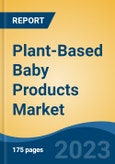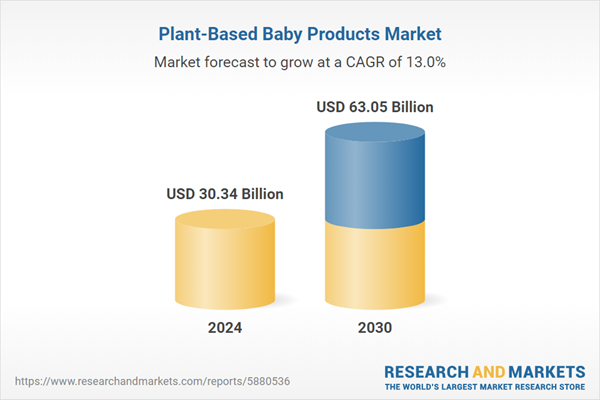Speak directly to the analyst to clarify any post sales queries you may have.
10% Free customizationThis report comes with 10% free customization, enabling you to add data that meets your specific business needs.
Innovations in plant-based proteins, oils, and extracts improve product efficacy while ensuring safety. Social media influence and wider availability through e-commerce platforms have accelerated market penetration. According to the U.S. Department of Commerce, e-commerce sales reached new highs in 2024, with online channels accounting for 22.7% of total U.S. retail sales, continuing a trend of at least 20% since 2020.
Key Market Drivers
Rising Health and Safety Consciousness Among Parents
A primary driver of the global plant-based baby products market is the growing health and safety awareness among parents. Modern caregivers are increasingly concerned about the potential side effects of synthetic chemicals, preservatives, and artificial additives commonly found in conventional baby products. Research linking certain chemical ingredients to skin irritation, allergies, and long-term health issues has encouraged parents to seek safer alternatives for their infants. Plant-based baby products, formulated with natural extracts, oils, and proteins, offer a hypoallergenic, gentle, and nutrient-rich solution, providing parents with confidence in the safety and well-being of their children. This shift toward preventive care and chemical-free options is prompting manufacturers to innovate and expand their plant-based product portfolios, including baby foods, skincare, diapers, and hygiene products, further fueling market growth.Key Market Challenges
Higher Production Costs and Premium Pricing
One of the primary challenges faced by the plant-based baby products market is the high cost of production, which translates into premium pricing for consumers. Sourcing natural, organic, and sustainably cultivated ingredients is significantly more expensive than conventional synthetic alternatives. Additionally, plant-based formulations often require specialized processing techniques to ensure safety, stability, and nutritional adequacy, which further increases manufacturing costs. These higher production costs are reflected in retail prices, making plant-based baby products less accessible to price-sensitive consumers, particularly in emerging markets. As a result, companies face the dual challenge of balancing affordability with quality while maintaining profitability. The premium pricing can limit widespread adoption and slow market growth, especially in regions where conventional baby products dominate due to lower costs.Key Market Trends
Innovation in Plant-Based Formulations
A major trend shaping the global plant-based baby products market is continuous innovation in product formulations. Manufacturers are increasingly investing in research and development to create products that combine nutritional efficacy with gentle, natural ingredients. For instance, plant-based infant formulas now incorporate proteins from peas, oats, rice, or soy to offer a safe alternative to dairy, addressing lactose intolerance and milk allergies. Similarly, baby skincare products are enriched with botanical extracts like chamomile, aloe vera, and calendula to provide soothing, anti-inflammatory, and hydrating benefits. This trend toward science-backed, plant-derived formulations is not only enhancing product safety but also broadening the range of available options, making plant-based baby products a viable choice for a wider consumer base.Key Market Players
- Himalaya Wellness Company
- Ringana GmbH
- The Honest Company
- Earth Mama Organics
- Verwaltung Hipp GmbH & Co. Vertrieb KG (Hipp)
- GAIA Skin Naturals
- Krauter Healthcare Ltd
- Biotropic Cosmetic
- Green People Ltd
- GreenKarma, LLC (Baby Mantra)
Report Scope:
In this report, the Global Plant-Based Baby Products Market has been segmented into the following categories, in addition to the industry trends which have also been detailed below:Plant-Based Baby Products Market, By Type:
- Skin Care
- Hair Care
- Toiletries
Plant-Based Baby Products Market, By Age:
- Newborn
- Infant
- Toddler
Plant-Based Baby Products Market, By Sales Channel:
- Supermarkets/Hypermarkets
- Departmental Stores
- Online
- Pharmacies/Drug Stores
- Others
Plant-Based Baby Products Market, By Region:
- North America
- United States
- Canada
- Mexico
- Europe
- France
- United Kingdom
- Italy
- Germany
- Spain
- Asia-Pacific
- China
- Japan
- India
- South Korea
- Indonesia
- South America
- Argentina
- Colombia
- Brazil
- Middle East & Africa
- South Africa
- Saudi Arabia
- UAE
- Turkey
Competitive Landscape
Company Profiles: Detailed analysis of the major companies present in the Global Plant-Based Baby Products Market.Available Customizations:
With the given market data, the publisher offers customizations according to a company's specific needs. The following customization options are available for the report.Company Information
- Detailed analysis and profiling of additional market players (up to five).
This product will be delivered within 1-3 business days.
Table of Contents
Companies Mentioned
- Himalaya Wellness Company
- Ringana GmbH
- The Honest Company
- Earth Mama Organics
- Verwaltung Hipp GmbH & Co. Vertrieb KG (Hipp)
- GAIA Skin Naturals
- Krauter Healthcare Ltd
- Biotropic Cosmetic
- Green People Ltd
- GreenKarma, LLC (Baby Mantra)
Table Information
| Report Attribute | Details |
|---|---|
| No. of Pages | 183 |
| Published | September 2025 |
| Forecast Period | 2024 - 2030 |
| Estimated Market Value ( USD | $ 30.34 Billion |
| Forecasted Market Value ( USD | $ 63.05 Billion |
| Compound Annual Growth Rate | 13.0% |
| Regions Covered | Global |
| No. of Companies Mentioned | 10 |








